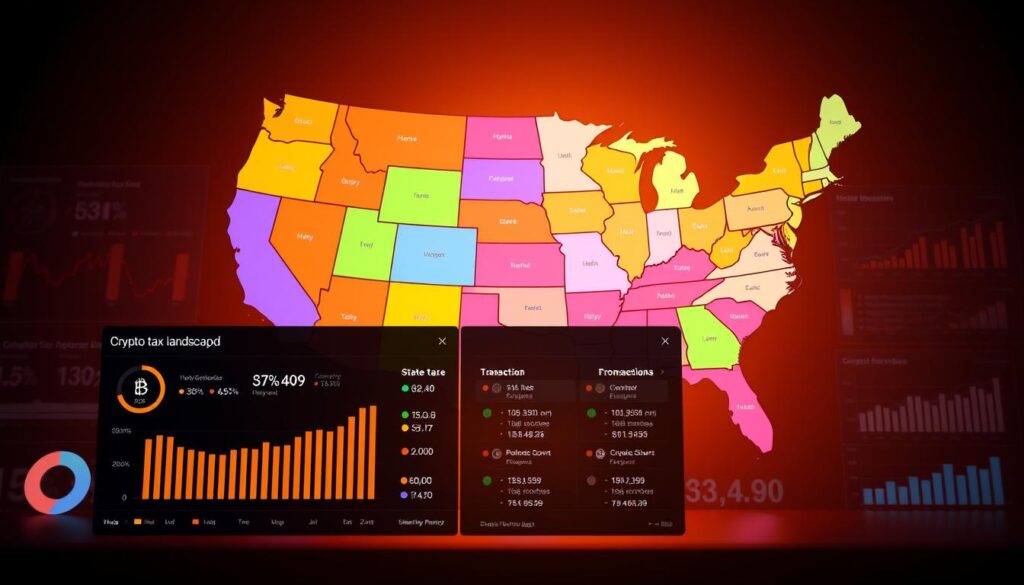Crypto swaps are not just simple exchanges. They are taxed by the IRS. When you swap one crypto for another, you face tax implications. The IRS sees digital assets as property, leading to capital gains or losses.
Understanding these rules is tricky. Traders must keep track of each swap’s value and report gains accurately. Making mistakes can lead to audits or penalties. This guide helps you understand crypto swap taxes, including what you need to do to follow IRS rules.
Key Takeaways
- Crypto swaps are taxable events under IRS property rules.
- IRS classifies crypto as property, altering how gains are calculated.
- Failure to report swaps violates cryptocurrency tax laws, risking fines.
- Accurate tracking of every swap’s value is required for compliance.
- This guide clarifies tax obligations to avoid legal consequences.
What Constitutes a Crypto Swap in the Eyes of the IRS
IRS rules say swaps in crypto are taxable and need to be reported. Knowing these rules helps you follow federal tax law. Swaps happen when you trade one crypto for another, leading to tax issues.
Direct Token-to-Token Exchanges
Trading Bitcoin for Ethereum on sites like Uniswap or Binance is taxable. The IRS sees it as selling the first asset and buying the new one. You figure out profit or loss based on the asset’s value at swap time.
DEX vs. CEX Transactions
- Centralized exchanges (CEX) like Coinbase send out tax forms (Form 1099-B) for reported deals.
- Decentralized exchanges (DEX) don’t send these forms, so you must keep track of swaps yourself. This includes when and what you traded.
IRS rules say you must report all swaps, no matter the platform.
Staking and Liquidity Pool Considerations
Getting rewards from staking or joining liquidity pools is taxable income. Adding tokens to platforms like Curve Finance is a taxable event. The IRS views these actions as taxable gains under current crypto tax rules.
The Basic Principles of Cryptocurrency Taxation
In the U.S., tax law treats cryptocurrency as property, not money. This means every transaction with crypto is subject to cryptocurrency tax laws. You need to track any gains or losses from these trades. Only selling or exchanging crypto triggers taxes, not just holding it.
Taxable events include:
- Trading crypto for USD or other assets
- Purchasing goods/services with crypto
- Receiving crypto as income or through airdrops
Actions that don’t trigger taxes are:
- Moving crypto between wallets
- Splitting coins during a fork
- Converting between stablecoins
Tax reporting for virtual currency trades requires filing Form 8949 and Schedule D. You must list all buy/sell dates, prices, and proceeds. Not reporting could lead to penalties up to 75% of unpaid taxes plus interest.
The IRS now uses blockchain tools to find unreported crypto activity. Not following the rules can lead to audits on crypto gains. To avoid trouble, track every trade and keep detailed records of all virtual currency dealings.
Tax Implications of Crypto Swaps: How the IRS Views Digital Asset Trades
Swapping cryptocurrencies is seen as a taxable event by the IRS. Knowing these rules helps avoid costly mistakes. Let’s explore the main points about tax implications of crypto swaps and capital gains on digital asset trades.
Like-Kind Exchange Rules Do Not Apply
Crypto swaps don’t get the same tax break as real estate exchanges. The IRS has always seen digital assets as property, not eligible for like-kind treatment. So, swapping Bitcoin for Ethereum means you have to report taxes right away.
Every Swap Is a Taxable Event
Trading on any exchange, decentralized (DEX) or centralized (CEX), is a taxable event. The IRS wants you to report capital gains or losses, even without using fiat currency. For example, trading $500 worth of XRP for $700 in SOL results in a $200 gain.
Determining Fair Market Value at Time of Exchange
To figure out gains, you need to prove the asset’s value at the time of swap. Use tools like CoinMarketCap or blockchain explorers to track prices. Tokens with low liquidity might need more data. Keep screenshots or transaction receipts for audits.
Calculating Your Cost Basis for Crypto Transactions
Accurate tax reporting for virtual currency trades starts with tracking cost basis. This is the original purchase price plus any fees. The IRS needs this info to figure out your capital gains or losses during crypto exchange taxation. Here’s how to handle it well:
Choosing an Accounting Method
The IRS has three approved methods for figuring out which coins are taxed when swapping assets:
- FIFO (First-In-First-Out): Uses the oldest purchases first, it’s simple but not very flexible.
- LIFO (Last-In-First-Out): Focuses on recent purchases, great for falling markets.
- Specific Identification: Allows you to choose which coins to sell, needing careful record-keeping.
Maintaining Cross-Platform Records
Trading on platforms like Coinbase, Binance, and decentralized wallets can make tracking hard. Keep a single ledger for every transaction’s date, price, and fees. Without this, your tax filings might not match up.
Automate with Tax Software
Tools like CoinTracking, Koinly, and CryptoTaxCalculator can help. They import your transaction history, calculate cost basis, and create IRS Form 8949 filings. Look at features like multi-exchange support and audit logs before picking one.
Short-Term vs. Long-Term Capital Gains in Crypto Swaps
The IRS treats crypto as property. This means capital gains on digital asset trades follow tax rules based on holding time. Short-term gains apply to assets held one year or less, taxed as regular income. Long-term gains happen when assets are held over a year, getting lower rates under cryptocurrency tax laws.
Short-term gains are taxed at your income tax rate, which can be up to 37%. Long-term gains have rates based on your income: 0%, 15%, or 20%. For instance, selling $10,000 of Bitcoin after six months at a $2,000 profit is taxed as regular income. But, holding it for 15 months gets you a lower long-term rate.
- Short-term (
- Long-term (>1 year: 0%-20% rates
Scenarios with multiple purchases of the same token can get complex. The IRS uses first-in, first-out (FIFO) rules unless specific lots are identified. Staking rewards or hard forks can also reset holding periods, changing tax outcomes. For more information, check out this IRS-compliant resource for tracking strategies.
Timing swaps to qualify for long-term rates can lower your tax bill. Use tax software to track holding periods and calculate gains accurately. Ignoring these rules can lead to penalties under changing cryptocurrency tax laws.
How DeFi Swaps Differ from Traditional Exchange Trades
Decentralized finance (DeFi) swaps have unique tax implications of crypto swaps compared to traditional exchanges. The IRS regulations on crypto transactions sometimes don’t cover DeFi’s technical details. This means traders need to be careful when reporting their activities.

Gas Fees and Their Tax Treatment
Ethereum’s gas fees cut into the money you get from swaps. You can deduct these costs as expenses. But, the IRS isn’t clear if this affects your cost basis. It’s important to keep track of these fees to figure out your net gains correctly.
Impermanent Loss Tax Considerations
Impermanent loss happens when the value of liquidity pool tokens goes down temporarily. These changes aren’t taxed until you take your assets out. Only losses that you realize after leaving the pool need to be reported to the IRS. Losses that aren’t realized stay hidden and don’t need to be reported.
Cross-Chain Bridge Transactions
Using cross-chain bridges to move assets might be seen as taxable events. The IRS might view these as sales if the tokens change form. Keep track of fees and value changes during these transfers to follow the reporting rules.
Without clear IRS regulations on crypto transactions, traders must keep detailed records of their DeFi activities. Auditors are getting more careful with these transactions. It’s crucial to save blockchain transaction IDs and timestamped price data to show you’re following the rules.
Common Misconceptions About Crypto Swap Taxation
Many crypto users get cryptocurrency tax laws wrong, leading to big mistakes. Let’s clear up the most common myths:
- Myth 1: “Crypto-to-crypto swaps aren’t taxable until I sell for USD.” The IRS sees every crypto swap as taxable. You must report gains or losses right away, even if you keep the assets.
- Myth 2: “DEX trades are anonymous, so the IRS won’t know.” While DEXs offer privacy, they don’t hide transaction data. The IRS uses special tools to track these activities, as shown in recent cases.
- Myth 3: “Small trades under $600 don’t need reporting.” There’s no minimum for reporting crypto trades. All swaps are taxable, no matter the size. Ignoring small gains can lead to audits.
- Myth 4: “Wash sales don’t apply to crypto.” Selling an asset at a loss and buying it back within 30 days locks in the loss. Not accounting for this under crypto exchange taxation rules can increase your taxable income.
There’s also confusion between taxable swaps and non-taxable transfers. Moving coins between wallets (same asset) isn’t taxed. But swapping ETH for BTC requires reporting. Those who ignore these rules face penalties like Form 8300 violations or FBAR fines. To stay compliant, track every swap and use IRS-approved cost basis methods outlined in Publication 544.
Record-Keeping Requirements for Crypto Traders
Keeping detailed records is key for crypto traders. The IRS wants traders to document every trade, swap, and transfer. Without these records, audits could result in penalties or disputes over unreported gains.
Essential Documentation for Audit Protection
The IRS requires clear records for all crypto transactions. Important details include:
- Date, time, and USD value of each transaction
- Counterparty wallet addresses or exchange IDs
- Purpose of each trade (e.g., trading, staking, or DeFi participation)
- Physical storage of records for at least six years
Transaction History Exports and Management
IRS rules say traders must export and organize data from exchanges like Binance or Coinbase. Many platforms limit how far back you can access data. So, it’s important to take proactive steps. Tax experts suggest using third-party tools to gather data from different accounts. Keeping records in secure cloud storage or encrypted spreadsheets helps meet compliance, even if exchanges shut down.
Blockchain Explorer Tools for Verification
Blockchain explorers serve as a permanent record for crypto transactions. Tools like Etherscan or Blockchain.com show transaction hashes, fees, and timestamps. They help verify details when exchange records are missing.
- Use explorers to cross-reference exchange data with on-chain activity
- Download and save explorer screenshots for audit evidence
- Verify USD values using historical price APIs
IRS audits focus on matching self-reported data with blockchain evidence. Ignoring these steps can lead to penalties, even if you made honest mistakes.
Tax Loss Harvesting Strategies with Cryptocurrency
Tax loss harvesting helps lower taxes on crypto trades. It works by selling assets bought too high to claim losses. This way, investors can pay less in taxes. Here’s how to do it:

- Identify holdings with losses using crypto tracking tools.
- Sell losing positions before year-end to lock in deductions.
- Avoid repurchasing the same asset for 30 days to prevent wash sale issues.
The IRS hasn’t made clear rules for crypto wash sales yet. But, proposed laws might follow stock rules. Even without clear rules, playing it safe can help avoid trouble. You can only deduct up to $3,000 of losses against income each year. Any more is carried over to the next year.
For example, selling a crypto for $5,000 less than its purchase price can create a $5,000 loss. This loss can offset gains from other trades, reducing what you owe in taxes. But, buying the same asset back soon might raise IRS questions.
Use tax software or get advice from a tax expert to keep track of costs and follow the rules. It’s important to act before December 31 to use losses for the current year. Not doing this could mean missing out on savings and facing penalties.
Special Considerations for NFT and Token Swaps
NFTs and special tokens make tax implications of crypto swaps more complex. They don’t follow the usual crypto exchange taxation rules. Knowing these differences helps avoid surprise tax bills.
Collectible Classification and Higher Tax Rates
NFTs are often seen as collectibles by the IRS. This means they face a higher long-term capital gains rate of 28%. Important factors include:
- Use case: Digital art vs. functional tokens
- Scarcity and uniqueness of the asset
- IRS audit trails tracking ownership history
Creator Royalties and Their Tax Implications
Creators earning royalties from NFT sales must report all income. This includes income from crypto. Royalties earned after the first sale are taxable income. Starting 2024, platforms issuing over $600 in royalties will need to provide 1099 forms.
Rules also apply to:
- Utility tokens: Treated as property exchanges
Security tokens: Regulated like stock transactions
Governance tokens: Classified based on voting rights and utility
Creators must keep track of all transactions using blockchain explorers. They should report gains and losses each year. Keeping good records helps avoid disputes during audits.
International Taxation Concerns for US Crypto Traders
US taxpayers with crypto on foreign exchanges face complex IRS rules. Not reporting offshore crypto can lead to big penalties. The IRS wants to know about virtual currency held abroad, affecting how you report taxes.
FBAR and Form 8938 Requirements
Accounts with over $10,000 in crypto on foreign platforms might need FBAR filings (FinCEN Form 114). If assets go over IRS limits, you’ll need to report them on Form 8938. The IRS sees foreign crypto exchanges as “foreign financial accounts.” Not following these rules can cost you up to 50% of your assets each year.
Foreign Exchange Compliance Challenges
- Foreign platforms rarely send 1099 forms, so you must track your gains and losses yourself.
- You need to keep records of all transactions to meet US reporting standards, even for decentralized exchanges.
- Tax treaties can change how you’re taxed on income from cross-border crypto trades.
US residents claiming foreign earned income exclusions must report crypto holdings in their country of residence. Controlled foreign corporations (CFCs) with crypto assets also face IRS scrutiny. Global data-sharing agreements like FATCA make it hard to hide offshore crypto activity from US authorities.
State-Level Taxation Differences for Crypto Swaps
Cryptocurrency tax laws differ across U.S. states, leading to unique tax situations for crypto swaps. Federal rules apply everywhere, but state laws add complexity. People living in Wyoming, Texas, and Florida don’t have to worry about state income tax, making it easier to report crypto gains.
On the other hand, states like California and New York have strict rules. They might tax crypto under existing laws, requiring detailed financial reports.

- No income tax states: Wyoming, Texas, and Nevada treat crypto as property, avoiding double taxation.
- Aggressive compliance states: California needs crypto tax forms with state tax returns. New York demands detailed digital asset disclosures.
- Pioneering regulations: Arizona and Ohio have issued formal crypto tax guidance, clarifying reporting expectations.
Where you live matters a lot. Moving to a state friendly to crypto could lower your tax bill. But, states like New Jersey track income from past homes. Colorado scrutinizes crypto mining profits due to energy use.
Some states, like Washington, are considering new taxes on digital asset transfers. This makes the tax landscape even more complex.
Businesses working in different states face extra challenges. For instance, a crypto trader in Florida but working in Illinois might have to report in both places. The IRS’s 2023 crypto tax guidance has prompted states like Massachusetts and Pennsylvania to update their tax rules.
Getting advice from a tax expert who knows state crypto tax laws is key. Ignoring these rules can lead to penalties, even if you follow federal guidelines.
IRS Enforcement Trends and Compliance Priorities
As the IRS gets more serious about cryptocurrency, knowing IRS regulations on crypto transactions is key. The agency is now watching more closely, thanks to the Infrastructure Investment and Jobs Act. This law made crypto exchanges report all transactions over $600 starting in 2024.
This change means platforms like Coinbase and Kraken must share user data with the IRS. This move greatly increases the IRS’s ability to monitor transactions.
Infrastructure Bill’s Reporting Overhaul
- Brokers must report all crypto transactions exceeding $600
- 2024 compliance deadline for Form 1099-K submissions
- Penalties for non-compliance up to $28,500 per violation
Landmark Court Cases Shaping Compliance
Recent court decisions have made cryptocurrency tax laws clearer. The 2023 IRS v. Coinbase case confirmed the IRS can ask for customer data. The Clark v. Commissioner ruling in 2022 also made it clear that every crypto swap is taxable.
These decisions mean the IRS will be stricter about digital assets. The 2023 Operation Hidden Treasure aimed at unreported crypto gains, checking thousands of taxpayers. Not following IRS regulations on crypto transactions could lead to big penalties, up to 75% of what you owe.
Now, traders must keep track of every transaction, fee, and DeFi activity carefully.
Working with Tax Professionals Who Understand Digital Assets
Managing crypto taxes needs knowledge in blockchain and tax law. Look for experts certified in tax reporting for virtual currency trades and crypto exchange taxation. They should have credentials like CPA with crypto specialization or enrolled agents with blockchain knowledge.
- Have you handled cases involving DeFi platforms or staking rewards?
- Do you track cost basis for cross-chain swaps?
- How do you stay updated on IRS crypto guidance?
Avoid general accountants; seek those who use crypto-specific software like CoinTracker or ZenLedger.
Prepare documentation including:
- Transaction logs from all exchanges
- Wallet addresses for audit trails
- Cost basis calculations
Tax attorneys may be needed for disputes, while CPAs focus on filings. Enrolled agents can represent clients in audits.
Complex scenarios like hard forks or NFT sales demand nuanced advice. Experts must explain how crypto exchange taxation rules apply to unique trades. Regular consultations ensure compliance with evolving regulations.
Navigating the Future of Crypto Taxation in a Changing Regulatory Landscape
Crypto taxation is changing as regulators keep up with digital assets. The IRS still sees crypto swaps as taxable events. But, new rules might change how we report capital gains from digital asset trades.
Proposals like stricter reporting thresholds and new wash sale rules could change tax strategies soon. These changes might affect how we handle taxes on digital assets.
Global efforts, like the OECD’s Crypto-Asset Reporting Framework, aim for international tax standards. U.S. taxpayers need to watch how these align with IRS rules on crypto transactions. Changes in DeFi’s tax treatment and cross-border crypto transfers could also impact compliance in the future.
Traders should be proactive. Use IRS-approved software to track every transaction. Always take a conservative approach for unclear situations, like calculating gains conservatively until rules are clear.
Stay updated with IRS guidance and work with experts who know the latest policies. This way, you can adapt to changes and avoid risks.
Advocacy groups want clearer crypto tax rules. But until then, taxpayers must balance following the rules with being ready to adapt. Keep up with IRS alerts and industry news to stay ahead. Being proactive helps you prepare for any regulatory changes.
FAQ
Are cryptocurrency swaps considered taxable events?
Yes, IRS rules say swaps are taxable. This means you’ll have to report capital gains or losses.
How do I report capital gains from crypto swaps?
You need to report gains on tax forms. Use Form 8949 and Schedule D for your return. Follow IRS crypto tax laws.
What is the difference between short-term and long-term capital gains in crypto trading?
Short-term gains are for assets held less than a year. They’re taxed like regular income. Long-term gains are for assets held over a year. They’re taxed at lower rates, depending on your income.
Are there any exceptions to taxable events for cryptocurrency transactions?
Most crypto exchanges are taxable. But, some transfers or exchanges might not be taxed. This depends on if there’s direct trading involved.
How should I calculate the fair market value of cryptocurrency at the time of a swap?
Find the fair market value by checking the current market price. Use reputable exchanges or market tools for this.
What record-keeping is required for cryptocurrency transactions?
Keep records of when, how much, and why you traded. Also, note the value in USD at the time. This is for IRS audits.
How do tax implications differ between centralized and decentralized exchanges?
Tax reporting for DEXs is harder than for CEXs. DEXs don’t provide detailed history. This makes accurate reporting tricky.
Is it advisable to use tax software for cryptocurrency tax calculations?
Tax software can help with calculations and record-keeping. But, for complex cases, get professional advice too.
Are there risks of non-compliance with cryptocurrency tax laws?
Yes, ignoring tax laws can lead to penalties and interest. It also draws IRS attention. So, it’s key to understand and follow the rules.
How do tax loss harvesting strategies work in cryptocurrency?
Tax loss harvesting means selling to offset gains. This can lower your tax bill. Just make sure to document these sales correctly.
What should I consider when choosing a tax professional for cryptocurrency transactions?
Choose someone with crypto tax experience. They should know blockchain and IRS rules. They should also understand DeFi and staking issues.


No comments yet